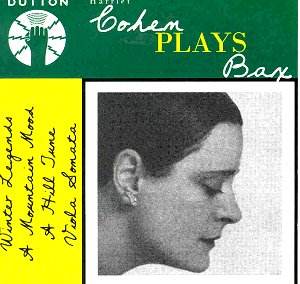It's a puzzle. Bax
was not short of a penny or two. He
never had to work at a paying job. He
lived in pursuit of his own inclinations.
Despite an affluence built on income
from the family's ownership of the Macintosh
patent and of a large plot on Oxford
Street he did not sponsor recordings
of his own music. True he died in 1953
only four years after the arrival of
the LP but 78s were quite viable. It's
not as if he had not written a myriad
short works that would have suited the
medium. As for the symphonies ... well
the only artefact from that era is the
multi-disc British Council-sponsored
Third Symphony conducted by Barbirolli.
What of Beecham in the Fifth, Cameron
in the Fourth, Goossens in the Second,
Barbirolli in the Sixth and Boult in
the Seventh? Perhaps Bax regarded recording
as in some way unworthy of his sensuous
music. Bax could easily have afforded
a series of 78s. If he had this might
have provided a treasury for the Bax
revivalists who clustered around the
vanishingly few recordings in the 1960s
and 1970s. Also it would have provided
a sound archive against which to compare
modern performance practice.
The present Dutton
disc includes Winter Legends -
a private off-air recording from BBC
radio - with three commercial recordings
made by Columbia in the 1930s. All are
significant because of the prime role
played by Harriet Cohen in each piece.
For much of her life she effectively
controlled performance of Winter
Legends and Symphonic Variations.
Winter Legends comes
from Bax's Nordic phase along with the
symphonies 5 and 6, the three Northern Ballads
and The Tale the Pine Trees Knew.
It is often said to be akin to the Third
Symphony. I cannot hear the kinship.
It is a work of monumental statement,
imaginative Sibelian resource, poetic
inclination balanced with gorgeously
rhythmic even violent statements. The
Third is more prone to self-absorption
and reflection. It has nothing of the
war dance adrenaline of Winter Legends
(e.g. at 4:47 and 6:26 in the first
movement). It is also often grouped
with the Symphonic Variations written
a decade previously. Once again the
relationship is only that both works
are major and for piano and orchestra.
Winter Legends has about it more
of Sibelius's Pohjola's Daughter
than the more Scriabinesque rhapsodic
Variations.
It is extremely valuable
to have the Cohen performance in the
Bax catalogue. However while I am sure
that Dutton have done their best with
the source material it remains muffled.
How you long for that gauze to be swept
aside. But it is not to be and of course
one soon becomes adjusted to the sound.
As a performance it
has a peculiar savagery. We have forgotten
BBC staff conductor (and occasional
composer) Clarence Raybould but he certainly
pulls no punches here. Typical is the
stonily ice-fragmented blast to the
war-dance at 10:28 (I): extremely exciting
and handled with more abandon by Cohen
than by Fingerhut on Chandos and by
John McCabe in either of his fine 1979
(with Leppard) or 1982 (with Handley)
broadcasts.
After a reflective
poetic central movement, not without
its own drama, we come to the finale
and epilogue. This begins with a mightily
original coup in which piano filigree
moving like a quickly glittering wave
is counterpointed by hushed strings
and a tuba solo. This is an icy effect
later used by Vaughan Williams in his
Sinfonia Antartica. Raybould
keeps the movement on its toes, pressing
forward and Cohen goads him even further
taking decoration and substantial statement
alike at quite a lick.
In general this recording
reminds us that Cohen's qualities were
by no means in decay in 1954.
A Mountain Mood
is impressionistic, musing, rather
Greig-like and dreamy. A Hill Tune
is also very characteristic Bax
with its delicate bone china piano filigree
and plangent bardic melody.
Lastly comes the Viola
Sonata with Primrose and Tertis. Bax
shows a sure hand. Two slow poetic movements
of Irish inclination frame a savage
little Bartókian central scherzo
- perhaps reflecting one of Bax's brutal
Celtic short stories. Both Primrose
and Cohen are well in tune with the
work's elusive moods; more so I think
than the Tertis version (on Pearl) even
if he does have the advantage of the
composer as his pianist.
Too much to hope I
suppose but if this CD were to be the
first in a series of ex-BBC broadcast
Bax revivals let me suggest Harry Newstone's
superb early 1960s reading of the Fifth
Symphony and Goossens’ of the Second.
Both survive in admirable mono sound
in the hands of collectors. They tell
an impressive and unexpected tale.
This disc represents
a valuable assemblage reminding us of
Cohen's vivid qualities through Winter
Legends. Chances are that Baxians
will never hear this recording sounding
better so now you can discard your old
Nth generation tape copies.
Rob Barnett


